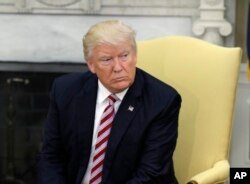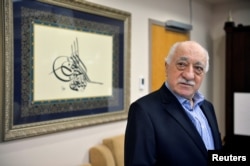Turkey's President Recep Tayyip Erdogan appeared both confrontational and conciliatory Friday, saying his scheduled talks next week with President Donald Trump could mark a “new beginning” in relations between the two NATO allies, who've been increasingly at cross purposes over Syria.
Erdogan cautioned, though, that Washington's decision to arm Syrian Kurds for an assault on the Islamic State's Syrian stronghold of Raqqa had damaged strategic relations between Turkey and America.
And he warned Turkish forces would continue military operations against Kurdish militiamen not just in Iraq, but also those allied with the U.S. in northern Syria.
The Turkish leader's comments, delivered before departing Ankara's airport for a stopover in China, were more nuanced than his sharp rebuke earlier in the week about the arming of the Syrian Kurds, and they contrasted with recent criticism of the U.S. by his officials, who have warned of dire consequences.
“The United States is still going through a transition period. And we have to be more careful and sensitive,” Erdogan said.
Mixed signals
Some media outlets reported Friday that Erdogan's remarks augur well for next week's discussions, but former Turkish lawmaker Aykan Erdemir wasn't convinced. He argued that Erdogan's practice has been to be “very careful with his comments about President Trump,” preferring to leave his aides to be harsher.
He predicted the Turkish leader would adopt tactics next week at the White House that he learned as a soccer player — namely, “The best defense is offense.”
“He will blitz Trump with Turkish complaints,” said Erdemir, especially over the decision to authorize the Pentagon to arm Kurdish militiamen who dominate the Syrian Democratic Forces, or SDF.
Ankara fears the Syrian Kurds will bolster Kurdish separatism in Turkey and argues U.S. arms supplied to the YPG will be transferred eventually to Turkey's outlawed Kurdistan Workers' Party, or PKK.
Analysts say Tuesday's meeting at the White House will have significant consequences not only for U.S.-Turkish relations, which became increasingly strained under former President Barack Obama and have not improved under Trump, but will also affect the final stages of the fight against the Islamic State terror group as well as Turkey's ties with NATO.
“What we are seeing is a deterioration of the alliance,” said Jonathan Schanzer, senior vice president of the Foundation for the Defense of Democracies, a Washington think tank.
He said the U.S. has plenty of grievances, too, to fire back at Turkey, including a spike in anti-Americanism in Turkey, Ankara's alleged involvement in the busting of sanctions on Iran, and Turkey's provision of what he called a “permissive environment” for some jihadists and Muslim Brotherhood groups like the Palestinian movement Hamas. Some grievances, he suspected, will be “swept under the carpet” when Trump and Erdogan meet, but others won't.
Turkey’s grievances
In the run-up to Tuesday's meeting, resentment has deepened on both the U.S. and Turkish sides. U.S. officials told VOA there was shock earlier this month when a senior Erdogan adviser publicly threatened Washington with accidental Turkish strikes against U.S. forces working with the YPG in northern Syria.
Whether Trump will choose to confront Erdogan or disregard those remarks will be consequential in setting the future direction of U.S.-Turkish relations, said Schanzer and fellow analysts at the FDD during a conference call with journalists.
U.S. officials told VOA that even if some of the Turkish grievances remained unresolved after Tuesday's meeting between Erdogan and Trump, they were confident something could be worked out, if for no other reason than that a fallout between the two countries would damage Turkey more.
Others aren't so sure. Turkey's daily Hurriyet newspaper argued Friday the decision to arm the Syrian Kurds would “likely poison the Turkish-U.S. alliance in the long run.” And other issues are eating away at the Turks as well — all at a time Moscow is actively wooing Turkey, adding to Russia's diplomatic momentum across the region.
The Gulen issue
Not only is Ankara furious about the U.S. alliance with the Syrian Kurds, Erdogan and his officials also are increasingly frustrated at what they see as stonewalling on a request for the extradition of the U.S.-based Muslim cleric Muhammed Fethullah Gulen, who Erdogan claims masterminded last July's failed military coup against him.
Erdogan returned to the Gulen issue Friday, vowing to pursue “to the end” Turkey's extradition demand. As a clear signal that Gulen's extradition would be raised by Erdogan, his justice minister, Bekir Bozdağ, presented last week in Washington “new evidence” against the Muslim cleric to U.S. Attorney General Jeff Sessions.
If there's any improvement in U.S.-Turkish relations because of next week's talks, it will come because both leaders strain to pull away from confrontation. But Trump is unlikely to reverse his decision to arm the SDF, according to Merve Tahiroglu, an analyst at the FDD.
She said she remained pessimistic about the chances of a good outcome from the Trump-Erdogan encounter. The Turkish leader “sees an opportunity to build an improved relationship,” but for that to happen, she said it would mean that as far as Erdogan was concerned, Washington is “following Turkey's lead.”







